Student Profile: Jordan Casty
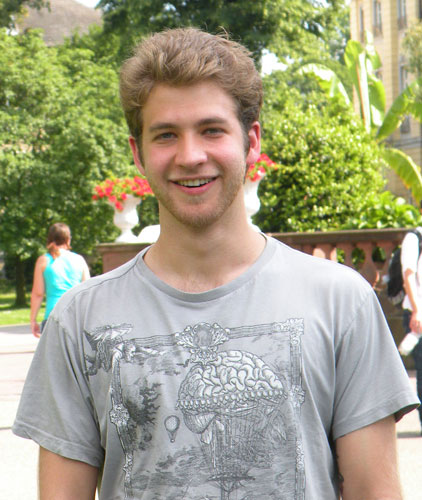
Jordan Casty<br>
<b>Hometown:</b> Chicago, Illinois<br>
<b>Major:</b> Professional Music<br>
<b>Instrument:</b> Voice
Photo by Lesley Mahoney
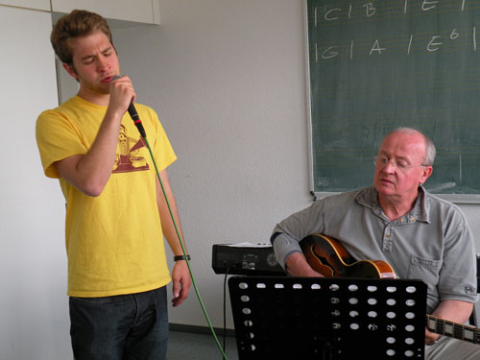
Jordan Casty in a private voice instruction lesson with Norbert Gottschalk at the Jazz & Rock Schulen in Freiburg, Germany.
Photo by Lesley Mahoney
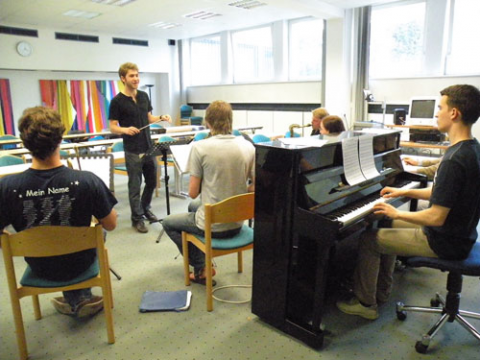
Casty conducts in Alexander Beer's class at the Jazz & Rock Schulen.
Photo by Lesley Mahoney
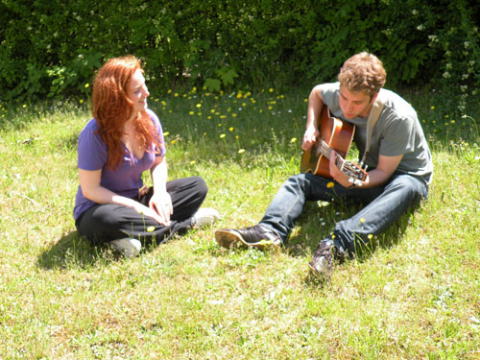
Casty and Berklee classmate Leah Dennis jam outside the Goethe-Institut, which hosts the Berklee study abroad students in its dormitories.
Photo by Lesley Mahoney
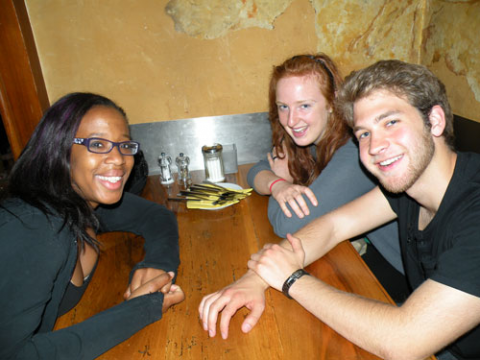
Vanessa Garber, Dennis, and Casty out to dinner in Freiburg.
Photo by Lesley Mahoney
Growing up in Chicago, Jordan Casty couldn't help but take a liking to the blues. "Blues just feels like home to me," he says.
A transformative experience with a guitar teacher sophomore year of high school took Casty's music-making to another plane. "He just opened up a whole new world," Casty says. "Before, accompanying myself with guitar and singing was just really fun. I couldn't imagine playing like the guitar players I loved: Stevie Ray Vaughan, Eric Clapton. I just didn't know how to do it."
"[With this teacher], I could put my music on my computer and just know what to play. I could interact with my heroes. That was it; I was hooked. I knew what I wanted to do and that I never wanted to stop playing guitar."
And he hasn't. Through Berklee, Casty's musical paradigm continues to expand—both on campus and recently, via the college's study abroad program at the Jazz & Rock Schulen in Freiburg, Germany.
Casty shares his thoughts on studying abroad, the songwriting process, and learning music theory.
How has the study abroad program contributed to your musical growth?
I think the classes I'm taking now—core classes—have a tendency to sneak up with their effect and their benefit. They're contributing to your musicality in the moment, but later on you realize their larger role. Conducting is a beneficial class; you're conducting real people. But also, if you're going to be in a band, interacting with people, you have to know how to communicate to them what you want and be a leader, a figure of trust. Conducting is really helpful with that.
The program has a fantastic core curriculum. The classical music classes that Berklee requires are done very well in Freiburg.
(See below for a clip of Casty conducting "America" for his conducting class with Jazz & Rock Schulen instructor Alexander Beer.)
Is this experience informing your songwriting?
I keep a notebook. I've been putting little inspirational ideas in it. The more I collect, the more color I can put into songs, the more depth. I've been very busy. This could be the busiest time of my life. There is a time for writing and a time for gathering inspiration, and this is a time for inspiration.
Besides the music courses, what else are you taking advantage of while in Freiburg?
I traveled a lot. We're right in the middle of everything. I've been to 10 or 11 different cities in the last three months, five or six countries. I've seen the most amazing things I've ever seen. Being in a central location makes everything so easy. I've been able to take trains for almost every trip. I only took one plane.
Culturally, the [study abroad] program is amazing because the dormitories are filled with fun-loving students from all over the world. It's an incredible time.
What advice would you give to someone who's thinking about coming to the study abroad program in Freiburg?
I'd tell them to get a Eurail pass. And try to meet people in the dorms, be kind of vulnerable and talk to people, because it can potentially be kind of lonely if out here and far from home.
How has Berklee impacted you as a musician?
Berklee has changed my whole musical perspective through theory, because [before] I wasn't learning a lot of how chords relate to each other. I was doing more lead guitar and just memorizing chords. Once I started looking at the "playbook of music," I could see all the moves. Everything became so much more connected and more simple. I was able to understand new songs right away. I was able to know what they were doing because I knew the moves. That was my first year—in Harmony 1—and it was incredible for me.
What draws you to songwriting?
What's so great about it is that you can find out so much about yourself. It's like looking into this really accurate mirror, this really vibrant, clear mirror, and finding out what you want to change, what you're happy about, who you are. I had a teacher one time who said, "We write to know what we're writing about."
I think the thing that makes a great song is when the melody and lyrics and harmony are all working together and it's one cohesive unit. [Professor] Pat Pattison calls that prosody. It doesn't really matter what you're talking about or what the message is as long as everything's working together to express something.
What are your songwriting goals?
What I'm trying to do in my songwriting is to be clear and honest and genuine. I really want to make songs that I love listening to, which I guess is the biggest breakthrough you can have as a songwriter. You can write a song, hear it come up on your iTunes, and let it play because you like listening to it. I've always gotten a high from performing my songs and from people enjoying them. Then I'd hear a recording and just wouldn't be able to sit and enjoy it. Then last year, I wrote two songs right before spring break and got them recorded [and liked hearing them]. It gave me so much confidence. It made me so much more peaceful in what I was doing.
